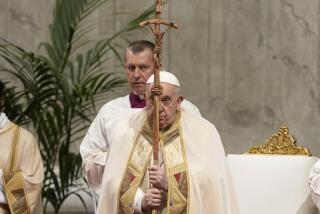Pope Has Message of Love
VATICAN CITY — Pope Benedict XVI on Wednesday issued his first encyclical, using the most important form of papal writing to expound upon the meaning of God’s love, erotic love between humans, and the relationship between the two.
Physical love, reduced to pure sex, becomes a debased commodity, “a mere ‘thing’ to be bought and sold,” the pope wrote; it must be enhanced by spiritual, selfless love for God and for one’s neighbor to achieve a higher and full meaning.
“Today, the term ‘love’ has become one of the most frequently used and misused of words,” the pope wrote in the 71-page document, titled “Deus Caritas Est,” or “God Is Love.” He said he hoped to restore the idea of love to its “original splendor” and, in so doing, strengthen the Roman Catholic faith.
Benedict’s choice of topic puzzled some observers. They expected the former Cardinal Joseph Ratzinger, who served more than two decades as the church’s chief doctrinal watchdog, to address a more controversial or dogmatic issue in the much-anticipated document.
Instead, eight months into his papacy, Benedict opted for a basic tenet in Christianity -- that God is love -- reflecting his desire to return to an emphasis on the faith’s fundamental values. An encyclical is always scrutinized closely for insight into a pope’s thoughts and plans, and the first such document is seen as a charter for a new papacy.
The first half of the treatise dealt with the relationship between eros, or physical love, and agape, or spiritual, faith-infused love. The rest of the document is concerned with charity -- the manifestation of love toward other people, especially the poor and disadvantaged.
“In a world where the name of God is sometimes associated with vengeance or even a duty of hatred and violence, this message [of love and charity] is both timely and significant,” the pope wrote. “For this reason, I wish in my first encyclical to speak of the love which God lavishes upon us and which we in turn must share with others.”
Three senior prelates presented the document to reporters at a crowded news conference at the Vatican on Wednesday. Benedict had previously announced its general contents.
The pope’s encyclical “opposes the tendency today to forget God,” said Msgr. Paul Josef Cordes, president of the Pontifical Council Cor Unum, the Vatican’s charities division, at the news conference. “It opposes the tendency of what can be called secularism.”
Cordes said earlier in the week that the pope’s choice of topic was “unexpected and even astonishing,” adding that universal prejudice holds that a priest talking about human love is “like a blind man talking about colors.” Benedict is able to counter that, Cordes said, by grounding his discussion firmly in Scripture and in the deep pastoral needs of the faithful.
“Love is a fundamental reality,” Msgr. William J. Levada, who replaced Ratzinger as head of the body that oversees doctrine, told a group of reporters after Wednesday’s news conference. The theme “provides a wonderful basis for the rest of his writings in his pontificate.”
Levada, former archbishop of San Francisco and the highest-ranking American at the Vatican, said the desire to help one’s neighbor was “given to us by God.” The pope’s treatise shows that Christians can “worship God ... [by] rolling up their sleeves and getting involved,” Levada said.
The encyclical’s simple theme also fits with Benedict’s broader political agenda, advocating traditional values such as marriage between man and woman (and not same-sex couples) and the need for an activist church when it comes to moral issues.
Practiced by the church and its believers, selfless love is the underpinning of important charity work and the search for justice, the pope said. In the second half of the encyclical, the pope wrote that the church had a vital political role, not to replace governments but to press for higher issues of social conscience.
“The church cannot and must not take upon herself the political battle to bring about the most just society possible. She cannot and must not replace the state. Yet at the same time she cannot and must not remain on the sidelines in the fight for justice,” the pope wrote.
“We do not need a state which regulates and controls everything, but a state which ... generously acknowledges and supports initiatives arising from the different social forces.... The church is one of those living forces.”
Before Wednesday’s release, Benedict alluded to problems in preparing and translating the encyclical, which apparently delayed its publication by several weeks. It was signed Christmas Day, a month ago. The pope’s spokesman, Joaquin Navarro-Valls, on Wednesday downplayed controversy over the delay.
But Sandro Magister, a leading Vatican analyst, reported this week that numerous Vatican documents had languished untranslated as part of a subtle campaign of protest against Benedict. Normally, documents are drafted in Latin or Italian and then translated into several languages, including English, Spanish, German and French.
In the encyclical, Benedict also rejected historic Marxist criticism that argues that Catholic charity is nothing more than “alms giving” that subverts the pursuit of justice. The church, the pope wrote, will always be compelled to practice charity, especially in a world that is shrinking but where poverty is growing. It is work that must be independent of ideology and refrain from proselytizing, he said.
“Love -- caritas -- will always prove necessary, even in the most just society,” Benedict wrote. “Whoever wants to eliminate love is preparing to eliminate man as such. There will always be suffering which cries out for consolation and help. There will always be loneliness. There will always be situations of material need where help in the form of concrete love of neighbor is indispensable.”
More to Read
Sign up for Essential California
The most important California stories and recommendations in your inbox every morning.
You may occasionally receive promotional content from the Los Angeles Times.











